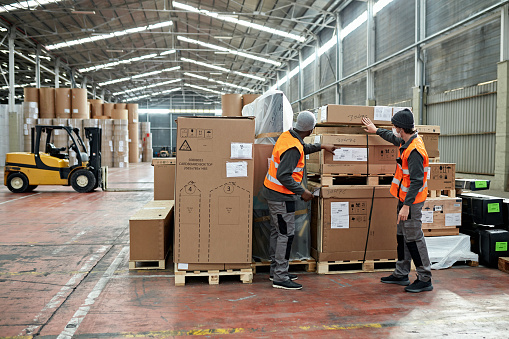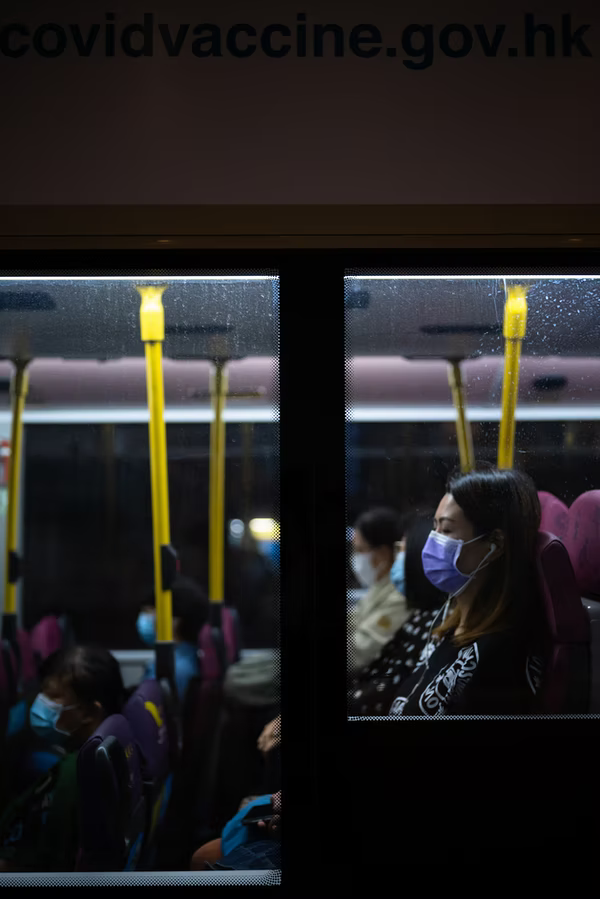Workers' Stories in the COVID-19 Era: Installment #12
October 5, 2021
Written by Christina Love (Undergraduate Student, Indigenous Studies & French)
Edited by Tinu K. Mathew (PhD Student, School of Human Resource Management)
In the twelfth installment of the Workers' Stories in the COVID-19 Era dialogue series, we interviewed Regan, a seasonal factory worker in the GTA. Regan describes what it was like working in a food production job in the summer seasons of 2020 and 2021, highlighting the precarity and lack of worker supports. She believes that safety is not being prioritized for essential workers and that there are some changes that need to be made in order to treat everyone with the respect they deserve.
For privacy, all names have been changed to protect the identities of our interviewees.
Interview
Christina: Can you describe your job, when you were employed, and what some typical duties were?
Regan: I was a full-time seasonal production line worker for a food production company. I found this job the year before the pandemic and have worked it the summers of 2019, 2020, and 2021. My daily tasks consisted of running machines and filling skids or wood pallets to prepare for shipping. What I would do is basically in the mornings I would help organize the other staff members and make sure they knew what their duties were—what orders need to be filled, and what orders need to be placed. During the day I would fill pallets and make sure the line machines didn’t stop working. As the day went on, I would make small fixes as they were needed. At the end of the day, I would do more administrative tasks—I’d log and track order numbers and clean.

Christina: How has your work been impacted by the pandemic?
Regan: There was a lot that happened. Right before I started working in the summer of 2021 there was actually a delay of about two weeks because there was a huge breakout of COVID-19 at the factory. So, the factory was closed until the workers were clear. Other than that, it was pretty much business as usual; we just tried to maintain more distance from each other. We’d try to eat outside and wear masks in the building mostly.
I will say that there was a difference between the first and the second summer of the pandemic. During the first year of the pandemic when I was working there, there wasn’t really much difference from what I had experienced pre-pandemic. Masks weren’t really mandated, and physical distancing wasn’t enforced, so it was very deficient in terms of safety. Of course, this year there was a lot more that they had to do to comply with Public Health rules and try to prevent more large outbreaks. The reasons they did this were purely economic; they didn’t want to get penalized, and they didn’t want to have to shut down the business.
Christina: Has your relationship with your coworkers and boss changed during the pandemic?
Regan: In some ways, yeah. The factory I worked in was very loud, so communication is always kind of hard regardless of the time, but masks made it almost impossible to hear people when they were talking or trying to get someone’s attention. This has meant that some stupid mistakes have been made and the relationship between coworkers became more strained. If someone was doing something wrong or a machine was broken and they needed help, unless you were right next to them and yelling into their ear, they wouldn’t be able to hear you.
In addition, there was a lot of atmospheric change. After work in a job like this, you’d usually hang out for a bit with the other employees, just chatting and socializing, or sometimes you’d all go out together for drinks or something. It was a lot more distant this year compared to last year and especially compared to before the pandemic.
In terms of management, they’ve been under a lot more pressure to maintain safety, given that the outbreak I talked about earlier was the second big outbreak that had happened there. They had to be more uptight about some of the rules. There was a lot more pressure because basically what had happened was quotas were the same as the years before because our demand hasn’t gone down, but there were heavy caps placed on hiring. What ended up happening was the workers complained a lot more about being overworked and being under a lot more pressure because they didn’t hire as many people as they should have. I’d say that we were understaffed by at least 40% compared to the last years, but we were still doing the same amount of production.
I’d say that we were understaffed by at least 40% compared to the last years, but we were still doing the same amount of production.
Christina: How did this gross understaffing impact you?
Regan: So, we have different speeds that we run the machines on. I’d say the average speed we run the machines on, at a safe level, was about 30, and that number refers approximately to bags per minute. Sometimes if you needed it to be a little quicker, you’d go to 34 and you’d still be ok. But because of the lack of staff, we’d have the machines going at 40-45. What this does for me, as someone who’d also work mechanics and try to keep these machines working, is increases my workload as they’d break down a lot more because of the strain of this high output. This made a lot more work and, counterintuitively, made things slower at times, and then management would be cracking their whips… It was an all ‘round messy situation.
To compensate for everything, what we ended up having to do would be longer shifts. We used to do standard 8-houur shifts which then became 9-hour shifts and sometimes it’d be 10-11 hours just because we needed to fill the daily quotas. Sometimes we’d be running around from 5am to 4pm, which is a lot of work, especially if you’re not expecting it.
Christina: Are you unionized and how do you think that this has impacted your pandemic working experience? And jumping off that, as a seasonal worker, did you get any benefits, sick pay, or overtime?
Regan: No, my company is not unionized and that did have a big impact on our working experience. There were a lot of disgruntled employees, like our forklift driver. He was probably one of the most overworked people at the factory and he’d always complain. Essentially, there were two forklift drivers, then, to cut costs, they fired one of them. That’s a 100% labour increase and I can guarantee you he was not making double. But his complaints never got taken seriously by management.
For us non-specialized workers, they wouldn’t have mechanics there all the time, or a manager there to run things, so we’d be left to our own devices, and I’d end up taking a leadership role most of the time. There wasn’t anyone there to argue for us, which was important especially during times we’d have to work 11 hours. During the 11-hour shifts we were entitled to an additional break that would never be given to us.
There were no benefits as a seasonal worker, although you did get overtime after, I believe, 44 hours. With the level of work we were doing, you’d pretty much be guaranteed overtime. I liked it but I can see why others had issues with it. Sometimes I’d work 6-day weeks, just because they needed someone able to run the machines or to do certain repairs not everyone could do, so I was on-call a lot of the time. There were some workers that were there 7 days a week though, and that was crazy. I think I would average about 55 hours a week, sometimes less, sometimes more.
The overtime was good, in my opinion, but there weren’t benefits or sick leave and I really resented that. For example, I needed to take two days off from work to get vaccinated and I got sick from the vaccine, so I had to take a couple more days off as well. I didn’t get sick pay for any of that and when some of my coworkers got sick with COVID, caught at work mind you, they got nothing either.
Christina: How has working during the pandemic impacted your mental and physical health and well-being?
Regan: There were definitely two sides of that coin. On the one hand, I was happy to be out of the house doing something and was grateful to be employed. On the other, it was scary sometimes working during the pandemic, especially when your coworkers are getting sick. Coming in this past year after an outbreak where literally everyone at the factory had gotten COVID was horrible; there was just this constant fear that I’d be next. There are three branches of the company I worked for: there’s production, where I work; administration and office work; and there’s the truckers who deliver our product, and everyone from all three branches got COVID this past spring.
There were also the workers who wouldn’t wear masks properly and who refused to get vaccinated and went partying. If anyone got sick, there was also this huge pressure to come back to work as fast as possible because management didn’t want to have to do layoffs and hiring all the time. It was tough trying to keep everything contained and keep working.
If anyone got sick, there was also this huge pressure to come back to work as fast as possible because management didn’t want to have to do layoffs and hiring all the time.
Christina: What supports and resources, if any, were available to you, as a worker during the pandemic, from the government and your employer?

Regan: My employer sometimes bought pizza for everyone so that was pretty dope *chuckles*. I think we were exempt from the pandemic pay so we didn’t get that extra two-dollar bump. I’m actually not sure how that happened because they are essential as a food production plant. Because we were working such long hours, my coworkers and I weren’t able to collect CERB, CESB, or CRB. There wasn’t any real government support, I’d say. In terms of workplace support, they didn’t offer much besides employment and even then… One of our drivers’ wives had died of COVID she contracted from him when everyone caught it at the workplace, and I think he only got three weeks off.
Christina: With pay??
Regan: Uhhh…no. I know when he was back he was like, “Oh, gotta make up for the lost pay.” The only thing I can say is that, though we didn’t get pay, our managers were fairly accommodating with giving time off to recover from vaccination.
I’d have to count my factory as one of the luckier ones too. We only had about 8-12 employees in at a time and they were fairly decent at implementing health protocols after Public Health made them. But you’d hear horror stories from the guys working in other factories in the area or on the news. There was this one plant down the street from ours that had around 200 workers and you’d periodically hear things like, “40 workers contracted COVID-19.” It was this dehumanizing experience of like, “Oh, people are dying, but at least I’m in a nicer place that still doesn’t offer pay when you’re sick.”
You need the money even though working some of these frontline factory jobs is almost a death sentence. Not working’s not really a choice for me; I have tuition and living expenses to pay for plus I help my parents with the bills sometimes.
Christina: What could your employer and the government have done better?
Regan: One major thing was PPE; the workplace was always having shortages of hand sanitizer, gloves, masks, soap. If you work in a food facility you sort of need gloves, but we were running out of them regularly. The only way for us to eat lunch and be properly socially distanced was to eat outside and they ordered some benches for us to do so. Problem was that it would rain a lot, or we’d get 30+ degree days where eating outside wasn’t really an option. If we ate indoors, there was a small 10x10 foot room for 12 people, so distancing wasn’t really an option in those conditions and there weren’t enough cleaning supplies to wipe things down after everyone was done. Our lunchroom was also split into a training room, so you’d always have new hires coming in and out. I think that better workplace safety measures and greater investment in preventing COVID would have been good.
In terms of the government, they could have done a lot better. We needed more financial support what with people losing houses and rationing their food, of course, but we also needed rule enforcement. They should have listened to the scientists and made sure everyone was following the evidence-based guidelines that keep us all safe. For instance, I can’t think of anyone who’s ever got anything more than a scolding for not wearing a mask or not wearing it properly, inside and out of work. They probably should’ve been getting fined so that they’d be more conscientious.
Christina: If you suddenly had godlike powers, how would you change things going forward?
Regan: This is a tough one. As much as there were the negative aspects to this job…I almost had to feel happy because I was getting money to pay rent. Definitely a weird mix of emotions and a bit Stockholm-y for sure. I’ve been kicked in the shins so much I can’t stand up straight.
Anyway, if I could change things, I’d change the government response to make it a lot safer and give the workers more support, especially for people who didn’t feel safe. For example, I’d have coworkers who were immunocompromised. So, 1) they couldn’t get vaccinated and 2) they were extra vulnerable to COVID.
A huge thing is workplace regulation and enforcement. What would happen to us on-site is that we were forced to work longer hours regardless of our feelings or commitments; they had quotas to fill, and we didn’t matter. Safety was also insufficient. We’d spray down door handles but not the machines or the lunchroom, and the ventilation of the facility was quite poor. At the very least, there needs to be stricter enforcement of things like that.
If I had ultimate power, however, I’d change regulations, government assistance, instate mandatory benefits, and mandate paid sick leave. It was unfortunate how essential workers were essentially being sacrificed just to reach certain quotas.
Christina: Is there anything you think the general public should know about working during the pandemic, particularly as a factory worker?
Regan: I hope the public realizes that these are not safe conditions for workers. Even beyond the dangers of working directly in an unsafe place, there’s the environmental factors. We were in a COVID hotspot and, a lot of times, the factory workers would all take the same bus to work. We’re having to take these risks, though, to feed our families and keep a roof over our heads.

Other than that, I want the general public to know how little assistance a lot of these workers could access. Some of my coworkers lost homes, family members, and businesses because of how little help there was for them. I’ve had coworkers say to me, “I feel so sick, but if I miss this day of work, I won’t be able to eat for the rest of the week.” It’s not a choice for a lot of people. There is no alternative for us.
Christina: Any final comments?
Regan: Yeah, I want to touch on how crazy the job search is, particularly compared to how many places are understaffed. There’s literally no one hiring and that creates a desperation when you don’t have something like UBI to back people up. In fact, one of my coworkers was a dentist who had to shut down his practice due to COVID-19. To be a dentist making $16/hour in a factory job is the perfect picture of how bad things are out there.
One of my coworkers was a dentist who had to shut down his practice due to COVID-19. To be a dentist making $16/hour in a factory job is the perfect picture of how bad things are out there.
One final thing is how exhausting all of this work and stress is. You just get bone tired and I’ve had friends tell me that they’ve grown to hate jobs they once loved because of their experiences working during the pandemic. We’re not lazy. We’re being exploited.
